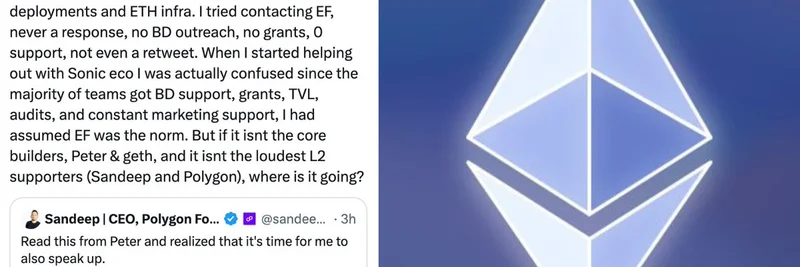The crypto world is buzzing again, this time over a tweet from DegenerateNews highlighting comments from Andre Cronje, the mastermind behind Yearn.finance and other DeFi projects. Cronje, who's no stranger to building on Ethereum, aired his grievances about the Ethereum Foundation (EF) – the organization that stewards Ethereum's development.
In his post, Cronje shared how he's personally burned over 700 ETH (that's Ethereum's native cryptocurrency, worth a small fortune) on deployments and infrastructure while building on the network. Despite his efforts, he claims zero support from the EF: no responses to outreach, no grants, no business development help, not even a simple retweet. He contrasts this with his experience helping the Sonic ecosystem, where teams apparently receive plenty of backing.
Cronje's confusion peaks when he questions where the EF's resources are going if not to core builders like Peter Szilagyi (lead dev of Geth, Ethereum's key execution client) or vocal L2 supporters like Sandeep Nailwal and Polygon. For those new to the lingo, L2 refers to Layer 2 solutions – scaling tech built on top of Ethereum to make transactions faster and cheaper, crucial for meme tokens and DeFi apps.
This isn't happening in a vacuum. Cronje's tweet quotes a longer rant from Sandeep Nailwal, Polygon's CEO, who admits he's questioning his loyalty to Ethereum. Nailwal credits Ethereum for drawing him into crypto (not Bitcoin, mind you) and expresses gratitude to Vitalik Buterin, Ethereum's co-founder. But he slams the community as a "shit show," pointing out constant public doubts from major contributors.
Nailwal shares personal anecdotes: friends trolling him for not rebranding Polygon as a Layer 1 (independent blockchain) to boost its valuation, and stakeholders questioning his duty because sticking with Ethereum might be costing billions. He highlights inconsistencies, like how Polymarket's success is celebrated as an Ethereum win, but Polygon gets sidelined despite its contributions.
The spark for all this? A letter from Peter Szilagyi, where he declared "Ethereum failed for me." Szilagyi criticized the EF for underpaying core devs, allowing protocol capture by insiders, and letting a small elite control the network's direction. He even revealed rejecting a $5 million offer to spin out Geth into a private company, sticking to his principles.
For meme token enthusiasts and blockchain builders, this drama underscores bigger issues in Ethereum's ecosystem. Meme coins thrive on low fees and high activity, often on L2s like Polygon or Base. If key developers feel unsupported, it could slow innovation or push talent elsewhere – think Solana, where some like Akshay BD (mentioned by Nailwal) have migrated.
Yet, Nailwal remains optimistic, promising a "final push" to revive the L2 narrative. Cronje's post echoes a call for transparency: Who's really getting the EF's support?
As meme insiders, we're watching how this affects the degen space. Will it lead to more migrations to friendlier chains, or spark reforms in Ethereum? One thing's clear – the conversation is heating up, and it's a reminder that even in decentralized worlds, community and support matter.
Stay tuned for more updates on how this unfolds for meme tokens and beyond. If you're building or trading on ETH, check out our knowledge base for tips on navigating these waters.




